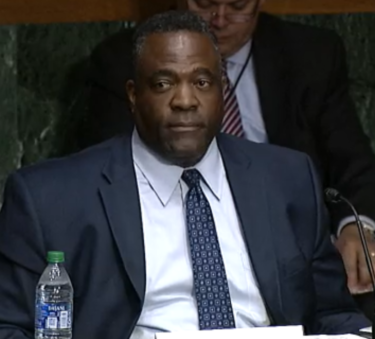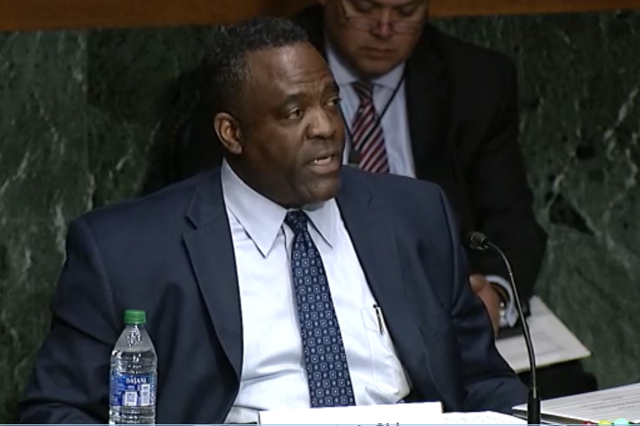The FBI identifies over 400 victims of online child sexual abuse activity over 75 days during the pandemic, according to testimony by the assistant director of the FBI’s Criminal Investigative Division.
On Tuesday FBI Criminal Investigative Division Assistant Director Calvin Shivers testified before the Senate Judiciary Committee that online predators are taking advantage of the COVID-19 pandemic by targeting children while they are at home and out of school.

Calvin Shivers
“Anyone who is exposed to child sexual abuse material during a virtual event may be traumatized by the experience. In the last 75 days, we have identified over 400 victims due to this activity” — Calvin Shivers
“School closures have increased the presence of children online. In addition, social distancing restrictions and the isolation of children at home may afford criminal actors with an opportunity to sexually exploit vulnerable children,” said Shivers.
“We are proactively countering this threat through active investigations. We’re also working to educate the public regarding the warning signs and the danger of online sexual exploitation,” he added.
In his written testimony, Shivers explained that online sexual exploitation comes in many forms.
- Individuals may coerce children into providing sexually explicit images or videos of themselves and/or younger family members. With the threat of posting the images publicly or sending them to the child’s friends and family if the child does not continue sending the material, they are forced into an abusive cycle of exploitation.
- Other offenders may make casual contact with children online, gain their trust, and introduce sexual conversation that increases in egregiousness over time.
- This activity may ultimately result in an online relationship that includes sexual conversation, the exchange of illicit images, and physically meeting the child in-person for the purpose of engaging in illegal sexual activities.
As many businesses and schools have turned to virtual meetings and classrooms, video streaming services like Zoom have become targets of Child Sexual Abuse Material (CSAM).
On May 22, the FBI announced that it had “received more than 240 reports of incidents throughout the US and in other countries in which a Zoom participant was able to broadcast a video depicting child sexual abuse material.”
The victims of these “Zoom Interruptions” are numerous.
“The FBI considers this activity to be a violent crime, as every time child sexual abuse material is viewed, the depicted child is re-victimized. Furthermore, anyone who inadvertently sees child sexual abuse material depicted during a virtual event is potentially a victim as well.”
To report specific type of illegal activity the FBI set up a form to fill out on its “Seeking Victims in the Zoom Disruptions Investigation” portal.
In his written testimony, the FBI assistant director added, “Anyone who is exposed to child sexual abuse material during a virtual event may be traumatized by the experience.
“In the last 75 days, we have identified over 400 victims due to this activity.”

William Hughes
“Child predators on the internet see widespread closing of schools, stay at home orders, and the reliance on internet platforms as the primary means of communication as an opportunity to prey on children” — William Hughes
Testifying in the same hearing, Associate Deputy Attorney General William Hughes said that the COVID-19 pandemic has changed the cyber threat landscape.
“Child predators on the internet see widespread closing of schools, stay at home orders, and the reliance on internet platforms as the primary means of communication as an opportunity to prey on children,” said Hughes.
While the topic of online child sexual exploitation took a backseat for most of the hearing, which focused on the issues of widespread fraud and price gouging during the pandemic, the written testimonies of Hughes and Shivers made it clear that criminals have been taking advantage of children online.
“The best signal we have of the growing threat is chatter we are seeing on the Dark Net, where offenders are able to speak freely. The offenders clearly see COVID-19 as creating opportunities for child exploitation,” wrote Hughes and United States Attorney for the District of New Jersey Craig Carpenito, in their joint testimony.
“As one individual wrote on March 21, 2020, ‘is nobody seeing the bright side of this pandemic?? Schools are closed so kids are at home bored … that means way more livestreams and its very clear moderators aren’t working right now since I’ve seen 3 hour streams go unbanned over the last few days where girls do whatever the f— they want. What a time to be alive.'”
To help make video streaming more secure from hijacking threats, the FBI recommends that users:
- Do not make meetings or classrooms public. In Zoom, there are two options to make a meeting private: require a meeting password or use the waiting room feature and control the admittance of guests.
- Do not share a link to a teleconference or classroom on an unrestricted publicly available social media post. Provide the link directly to specific people.
- Manage screensharing options. In Zoom, change screensharing to “Host Only.”
- Ensure users are using the updated version of remote access/meeting applications. In January 2020, Zoom updated their software. In their security update, the teleconference software provider added passwords by default for meetings and disabled the ability to randomly scan for meetings to join.
- Lastly, ensure that your organization’s telework policy or guide addresses requirements for physical and information security.
The COVID-19 crisis has caused many organizations and schools to conduct virtual meetings/events, some of which are open to the public.
As individuals continue the transition to online lessons and meetings, the FBI recommends exercising due diligence and caution in your cybersecurity efforts.
Uncovering human trafficking with tech, typologies, trails of money












